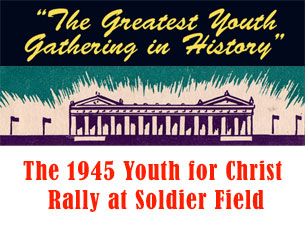Meanwhile, in Chicago, at about the same time that Wyrtzen was filling Madison Square Garden, evangelist Torrey Johnson and Chicagoland Youth for Christ were also moving into larger quarters. After drawing large crowds at Orchestra Hall all summer, Johnson and his team planned a huge victory rally in Chicago Stadium for October 1944. Thirty thousand people attended the rally with evangelist Merv Rosell the principal speaker, as well as some familiar faces—Gil Dodds testifying, and Bev Shea singing.
Spurred on by this success, Johnson and the Youth for Christ team planned a Memorial Day Victory rally that would be the “biggest youth rally yet.” And it was. He rented mammoth Soldiers Field and put on a spectacular show of shows. Johnson invited my father to be the main speaker. He had looked up to Percy ever since his student days at Wheaton when he was a freshman and Percy a senior and had invited him to speak at his church the year before on one of his tours. So Percy was probably not surprised to get the call.
He set out by overnight rail to Chicago, arriving Wednesday morning, May 30, with eager anticipation, but not knowing quite what was coming. At 6:30 p.m., seventy thousand people gathered in the stadium under clear skies. Chuck Templeton of Toronto Youth for Christ was master of ceremonies. Music was provided by a three-hundred-piece Salvation Army band, a five-thousand-voice choir, and soloists Pruth McFarlin (“America’s greatest Negro tenor”) and Bev Shea. One medley of gospel numbers, directed by Merrill Dunlop, featured eight grand pianos, vibraharp, organ, and chimes. Early in the program, five hundred white-uniformed nurses in the formation of a cross marched down the field honoring the war dead. A missionary pageant representing six different countries featured men and women in native costumes forming a star in the center of the field, while representatives of those countries spoke on stage. (Billy Graham spoke for the United States.) Gil Dodds ran two spotlighted laps around the stadium and gave a testimony. Percy preached, and hundreds responded to his invitation by turning in cards indicating that they had accepted Christ. At the close, the lights were turned out and the choir sang ‘We Shall Shine as the Stars in the Morning” as a spotlight from a beacon in the center of the field revolved around the vast audience.’
I have often wondered what my father felt as he stepped to the podium to address seventy thousand people. There is no record of his sermon or even his sermon topic. I doubt very much if he wrote anything new for this service or even made lengthy notes. Relying on the Lord for strength and speaking extemporaneously from a simple outline, he did what he had done on thousands of other occasions—he brought his audience to the realization that they were sinners in need of a Savior and he asked them to accept Christ into their lives. Percy may have felt that his role as messenger, as soul winner, was diminished somewhat by all the hoopla and pageantry surrounding his message. He would have liked to have had an altar call and may have wondered why this was not possible even in the huge stadium. What, after all, was the purpose of all this if not to win more lost souls to Christ?
Years later, when Johnson was talking about the Soldiers Field rally in an interview, he remembered something that Percy had done when the entire team gathered the next morning to assess the rally and its results. The mood was euphoric, for the rally had gotten favorable coverage in the local papers and the national wire services. Johnson recalled that Percy’s reaction was to challenge them all by taking from his pocket a “Horton’s Gospel of John” (which he always carried with him) and reminding them of the importance of winning individual souls to Christ through personal evangelism. Percy was certainly not opposed to mass evangelism, but I imagine he felt that the rally organizers were getting too caught up in the numbers game and in putting on a spectacular show. Apparently Johnson got the message. |



